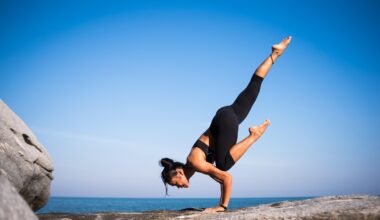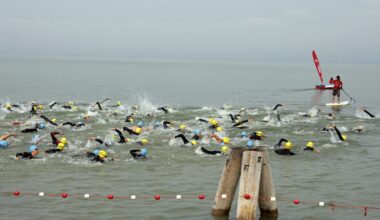Partner Yoga for Athletes: Boost Performance and Recovery
Partner yoga offers a unique approach for athletes seeking to enhance their performance and recovery through the practice of yoga. This engaging method encourages athletes to work together, promoting deeper connections and trust. Building strength, flexibility, and balance becomes more enjoyable when shared with a partner. The benefits of partner yoga extend far beyond physicality; it fosters emotional support and better communication skills, which are essential for any team-oriented sport. Simple poses like Downward Dog and Warrior can be modified for two practitioners, allowing one partner to support the other. This synergistic collaboration helps enhance body awareness and improved proprioception. The playful nature of partner poses cultivates camaraderie, breaking the monotony often associated with solo workouts. Consistent practice can lead to injury prevention, making it a valuable addition to any athlete’s training regimen. Furthermore, sharing these experiences reinforces team spirit, helping athletes feel more connected. By integrating yoga into their routine, athletes can experience enhanced performance, quicker recovery, and a more profound understanding of their bodies overall.
Enhancing Flexibility and Strength
Incorporating partner yoga into an athletic training routine can significantly enhance both flexibility and strength. Through collaborative poses, participants can guide each other, facilitating a deeper stretch that may be harder to achieve alone. This shared experience encourages athletes to explore their limits, leading to increased range of motion in joints and muscles. Dynamic poses like crescent lunge and backbends become more accessible with the help of a partner, which can ultimately improve athletic performance. Furthermore, the increased communication required during partner yoga fosters trust among teammates, promoting a culture of support and encouragement. Building strength through resistance poses helps athletes engage their core and various muscle groups effectively. Engaging in partner workouts creates accountability, motivating both individuals to push their limits safely and efficiently. Athletes may also experience improved mental focus and concentration through yoga, which translates into better performance in competitive situations. Pairing yoga with traditional training techniques can lead to profound developments, equipping athletes with tools necessary to excel during competition while minimizing downtime related to injuries.
One of the most significant advantages of partner yoga lies in its ability to cultivate mindfulness during practice. Mindfulness is essential not only in yoga but also in sports performance, allowing athletes to stay present and focused during competitions. When practicing partner poses, athletes must remain attuned to their bodily sensations and their partner’s movements. This heightened awareness enhances their ability to tune out distractions, such as crowd noise or competitive pressure. Additionally, mindfulness helps regulate breath, which can be vital for maintaining energy during physical exertion. Consistent practice in partner yoga nurtures concentration skills, leading to improved performance during high-stakes situations. The bond formed between partners can also mimic the dynamics of sport, further aiding the development of synchrony and teamwork. Enhanced emotional intelligence learned through practicing yoga can improve communication among teammates, fostering a greater understanding of individual strengths and weaknesses. Emphasizing mental skills alongside physical training encourages a well-rounded approach to athleticism, ultimately leading to better results, increased resilience, and a healthier mindset.
Cultivating Emotional Support and Teamwork
Partner yoga provides an excellent opportunity for athletes to cultivate emotional support and develop strong teamwork skills. Participating in activities that require cooperation can break down barriers between teammates, fostering stronger relationships built on trust and communication. This emotional connection boosts morale and team spirit, which can have a significant impact on performance during competitions. When athletes experience mutual support, they feel more comfortable and confident in their abilities, translating into enhanced performance on the field. Through sharing partner poses and challenging each other, athletes can help transform stress into positive energy, improving overall well-being. By focusing on collaboration and communication during partner workouts, athletes learn to be more attuned to those around them, enhancing their social awareness. This connection offers invaluable life skills applicable beyond sports and into their personal lives and careers. Studies suggest that teams displaying high emotional intelligence tend to perform better, highlighting the vital role of emotional connections in group dynamics during competitive sports.
Partner yoga activities are beneficial not only for physical performance but also for mental resilience. Athletes often face various pressures, both physical and psychological. Engaging in partner yoga allows athletes to cultivate stress management techniques and recovery through relaxation. By practicing deep, mindful breathing together, athletes can turn down the mental chatter that often accompanies high-performance scenarios. This focused breathing during yoga sessions provides an efficient method for athletes to ground themselves amidst the chaos of competition. Practicing poses that challenge their balance and core strength help develop mental toughness, ultimately transferring to their performance when facing pressure situations. Emphasizing mindfulness throughout these practices allows athletes to be better prepared psychologically during competitions. Additionally, the support system created through partner yoga can be invaluable when dealing with the inevitable ups and downs of athletics. Developing a routine involving partner yoga can contribute to faster recovery from physical exertion and promote a more cohesive team attitude. Ultimately, these techniques help athletes develop a more balanced mindset necessary for fortifying their perseverance in high-stakes performance scenarios.
Effective Recovery Techniques
The key to optimal athletic performance lies not just in training, but also in recovery. Partner yoga provides a gentle yet effective method for athletes to facilitate recovery and relaxation after intense workouts. Incorporating restorative poses into their routine allows athletes to release tight muscles and promote better blood circulation. Gentle stretching and the rhythmic flow of partner yoga contribute to muscle relaxation while allowing for gentle engagement with core stability. This collaborative practice encourages athletes to unwind by sharing their recovery experience with someone else, making it more sociable and enjoyable. Moreover, partner yoga can help to enhance flexibility through passive stretching, which enables the other partner to assist in the stretching process. As both partners work together, they can deepen the stretches and ultimately achieve a higher level of relaxation. This teamwork promotes camaraderie and increases accountability, making recovery progress more likely to occur. Having someone else guide you through muscle release techniques can also have psychological benefits, as shared experiences create a lasting bond that energizes both athletes.
In conclusion, partner yoga is a fantastic tool for athletes aimed at boosting performance and recovery. The benefits extend well beyond mere physical enhancements. By fostering teamwork through collaborative poses, athletes strengthen their bonds, improving overall trust and communication within teams. Furthermore, partner yoga encourages mindfulness, essential for managing stress, and nurturing mental focus essential for athletic success. These beneficial practices make athletes more resilient—both physically and mentally—enabling them to navigate the challenges they encounter in their sports. Incorporating these principles into their training can significantly impact their development as athletes. The shared goals of physical fitness and emotional well-being cultivate a supportive environment, essential for any athlete’s journey. The highly adaptable nature of partner yoga ensures that its benefits can be integrated into various sports, regardless of discipline. With the right mindset and commitment, athletes can unlock their potential while reaping numerous rewards through the collaboration that partner yoga provides. Ultimately, adopting partner yoga creates a positive impact on performance levels, recovery speed, and overall happiness in the athletic pursuit.
Final Thoughts
Choosing to integrate partner yoga into an athletic training regimen is a transformative approach toward personal and team growth. The ever-evolving demands of competitive sports necessitate innovative recovery methods and performance enhancements, making partner yoga a timely solution. By sharing the experience of both physical practice and emotional support, athletes can unlock new levels of achievement together. Through the unique benefits provided by partner yoga, athletes will discover newfound strength and flexibility while also fostering improved relationships with teammates. These interconnected approaches to both physical and emotional health will contribute to sustainable growth and enjoyment in the sport. When athletes invest in practices that nurture both body and mind while creating connections with others, they will cultivate longevity in their athletic journey. The movement towards connecting physical practices with emotional intelligence is vital for sustained success in competitive environments. Adopting partner yoga emphasizes the importance of teamwork and support in achieving individual and collective goals in sports. So, when you look for ways to foster your athletic success, consider bringing partner yoga into your routine to experience the multifaceted benefits it offers.


